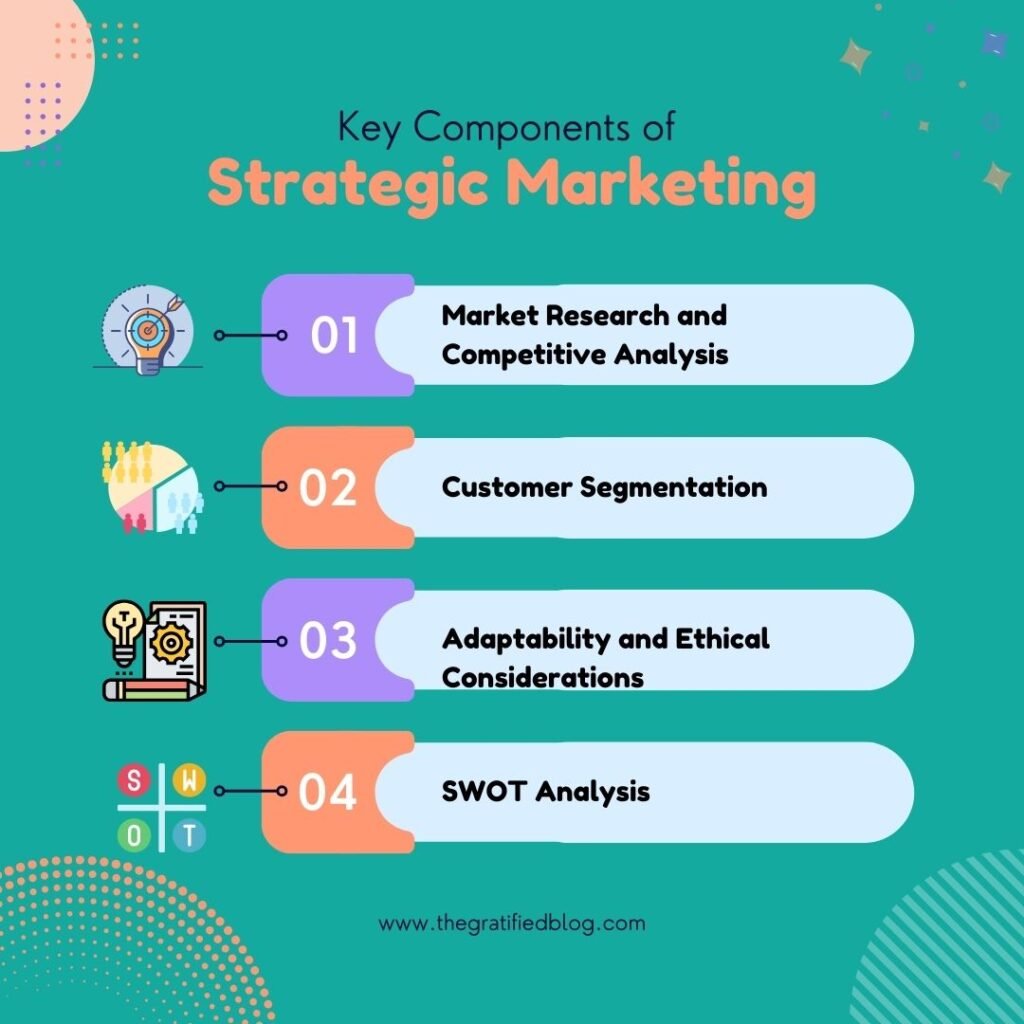
In the fast-paced and ever-evolving world of business, strategic planning in marketing has become the cornerstone of success for organizations of all sizes and industries. Gone are the days when marketing was merely about promoting products or services. Today, it’s about crafting a well-thought-out strategy that aligns with your business goals, reaches the right audience, and sustains growth over the long term.
This comprehensive guide will delve into strategic marketing, exploring what it is, why it matters, and how to implement it effectively to drive your business forward.
What Is Strategic Marketing?
Strategic marketing is a comprehensive approach to planning, implementing, and managing marketing efforts aligning with an organization’s strategic goals and objectives. It goes beyond traditional, ad-hoc marketing activities by considering a business’s bigger picture and long-term vision.
The Importance Of Strategic Marketing
- Alignment with Business Goals: One of the primary reasons strategic marketing management is crucial is its capacity to synchronize marketing initiatives with overall business objectives. Instead of pursuing disconnected marketing activities, organizations can focus on strategies that contribute directly to growth and profitability.
- Competitive Advantage: A well-executed strategic marketing plan Can offer a substantial competitive edge in a competitive landscape marketplace. By understanding the market, customer needs, and competitors, you can position your brand effectively and differentiate yourself from the competition.
- Customer-Centric Approach: Strategic marketing places the customer at the center of decision-making. It involves thorough research to understand customer preferences, behaviors, and pain points, enabling businesses to Customize their products or services to address these requirements effectively.
- Adaptability: Strategic marketing allows for adaptability in a constantly changing business environment. It enables organizations to react to market shifts, emerging trends, and new opportunities while staying true to their long-term vision.
- Resource Allocation: Strategic marketing helps organizations allocate their financial and human resources more efficiently. Companies can optimize their ROI by prioritizing marketing efforts that are most likely to yield the best results.
What Constitutes The Essential Elements Of Strategic Marketing?
Successful strategic marketing is built upon several key components, each contributing to the strategy’s overall effectiveness.

Market Research And Competitive Analysis
Before crafting a strategic marketing plan, gathering data and insights about your target market is essential. This includes demographics, psychographics, and market trends. Conducting market research helps you identify opportunities, threats, and market voids that your business can exploit and address.
Understanding your competitors is crucial for positioning your business effectively. Evaluate their strengths and weaknesses, pinpoint market gaps, and find opportunities to differentiate your brand. A competitive analysis can reveal untapped growth potential.
Customer Segmentation
Strategic marketing acknowledges and addresses customer diversity by implementing customer segmentation. By categorizing your target audience into distinct groups based on common characteristics, you can customize marketing Tailoring efforts to address the particular requirements of each segment, thereby enhancing the likelihood of success.
This targeted approach recognizes different customer groups’ unique Preferences and behaviors, enabling businesses to generate more relevant and impactful marketing campaigns.
Adaptability And Ethical Considerations
Adaptability is crucial in the dynamic market landscape. It is essential to be prepared to adjust your marketing strategy in response to changing conditions and emerging trends. This flexibility ensures that your approach remains effective and aligned with the evolving market demands.
Additionally, ethical considerations play a pivotal role in strategic marketing. Adhering to ethical standards safeguards your brand’s reputation and contributes positively to society. Conducting business with integrity builds trust with your audience and creates a sustainable foundation for long-term success.
SWOT Analysis
Conducting a comprehensive evaluation, commonly known as a SWOT analysis, involves scrutinizing Strengths, Weaknesses, Opportunities, and Threats within your organization. This analysis aids in assessing internal factors, including strengths and weaknesses, alongside external factors, such as opportunities and threats.
A SWOT analysis becomes a valuable tool for guiding strategic marketing decisions by providing a clear snapshot of your current position. It helps organizations capitalize on their Leverage strengths, rectify weaknesses, capitalize on opportunities, and counteract threats within their ever-changing business landscape.
Setting Clear Objectives And Strategy
Establishing precise and measurable marketing objectives is paramount for monitoring progress and aligning with overall business goals. These objectives are ideally structured using the SMART criteria—specific, measurable, achievable, relevant, and time-bound.
A comprehensive strategy should be devised alongside clear objectives, encompassing critical elements like product development, pricing, distribution, and promotion. This holistic strategy serves as a roadmap to attain the established objectives and ensures a coordinated approach across various facets of the marketing mix.
Implementation And Performance Measurement
The successful execution of a marketing plan hinges on a well-structured implementation strategy. This involves assigning responsibilities, establishing timelines, and monitoring key performance indicators (KPIs) to gauge progress. Regularly measuring performance against predetermined benchmarks allows for timely adjustments and optimizations to enhance the effectiveness of marketing tactics.
By aligning implementation with objectives and continuously evaluating performance, organizations can adapt to evolving market conditions and remain dedicated to attaining their marketing objectives.
Challenges In Strategic Marketing Management

While strategic marketing can yield significant benefits, it has its challenges. Some common hurdles include:
- Rapid Technological Changes
Keeping up with the pace of technological change can take time and effort. However, it’s essential to embrace new technologies to stay competitive.
- Data Privacy and Security
As data-driven marketing becomes more prevalent, organizations must navigate the intricacies of data privacy and security regulations to protect customer information.
- Globalization
Venturing into global markets necessitates a profound comprehension of diverse cultures, regulations, and consumer behaviors.
- Measuring ROI
Demonstrating the return on investment for marketing initiatives can be challenging. Implementing effective measurement and tracking systems is crucial.
- Talent and Skills Gap
Finding and retaining skilled marketing professionals who can navigate the complexities of digital marketing, data analytics, and emerging technologies can be challenging.
- Intense Competition
Competition is fierce in most industries. Distinguishing oneself in a saturated market demands innovative strategies and a profound comprehension of customer needs and preferences.
The Role Of Technology In Strategic Marketing Management

Strategic marketing is heavily influenced by the pivotal role of technology in today’s digital age. Here are some ways technology enhances strategic planning in marketing efforts:
- Data Analytics
Sophisticated analytics tools offer a glimpse into customer behavior, empowering organizations to formulate data-based decisions, and examining data aids in recognizing patterns, preferences, and opportunities for enhancement.
- Automation
Automation tools in marketing streamline Automated tasks, like email campaigns and social media posts, liberating marketing teams to concentrate on more impactful activities, such as strategic planning and creative development.
- Personalization
Technology enables organizations to deliver highly personalized marketing messages to individual customers, improving engagement and conversion rates.
- Social Media
Social media platforms provide avenues for precise targeted advertising and customer engagement, making them valuable tools for strategy planning.
Conclusion
In today’s ever-changing business landscape, strategic planning in Unlocking growth is contingent upon effective marketing success. It’s not just about marketing; it’s about Harmonizing your marketing initiatives with overarching business goals. By understanding your audience, setting clear goals, leveraging technology, and staying adaptable, you can confidently navigate the complexities of the market.
But our journey doesn’t end here. Feel free to share your experiences, inquiries, and insights in the comments below. Let’s build a community of strategic marketers who learn from each other and collectively shape the future of marketing. Together, we can take our businesses to new heights.








No Comments